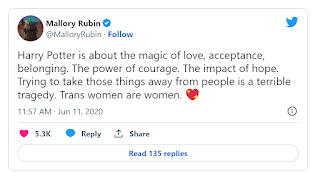The controversy around J.K. Rowling and her comments about the trans community is continuing to rumble on. There are passionate people on both sides, and the issue is not going away. The Independent writes that "The situation has now become a toxic brew of prejudice, misinformation and tragedy. How has it come to this?" It's finally time for me to take a proper look at the whole business. And, as I've often discovered when writing about a complex subject, there just isn't room in one article to put it all in, so I've decided to split this one into two parts.
The background
First, it's well worthwhile starting at the beginning. J.K. Rowling was (basically) a penniless single mother when she wrote Harry Potter and the Philosopher's Stone. The book and its many sequels have gone on to be stratospherically successful, making her the most popular author ever. Along with this success, there have been several very positive externalities. Her books became popular with children, which encouraged them to read--many kids (including sadly, one of mine) will only read stuff on a screen, not on a page. Along with this welcome boost in literacy, the translations of the books into other languages (you can even get the first one in Latin) has improved linguistic skill too.
 |
| Joanne Rowling, the artist known as JK |
Third, adults have got in on the books too. They even started to print Harry Potter books with more "adult" covers, so that adults reading them in public places wouldn't be embarrassed by being seen reading what was ostensibly a children's book. I have devoured all seven of the Harry Potter books, and loved reading every page, and plainly I'm not alone.
Fourth, while Rowling has earned a huge fortune, she has also given away literally millions, to all sorts of charities and good causes. So her career as a philanthropist is not to be sneezed at either. And she's more than a little bit gorgeous, if I may say so. And I know two people who have interacted with her for a decent period of time and said she was thoroughly lovely in person.
Rowling and Gender
Rowling's first (publicised) encounter with gender was the name on the cover of her books. Bloomsbury decided that her books would be most popular among boys, and it was felt that they would be less likely to read a book if they thought it was written by a woman. Therefore, she was asked to put her initials on instead, to conceal her gender. Unfortunately, Rowling has no legal middle initial, so she chose the initial K from her paternal grandmother Kathleen, and the name J.K. Rowling was born.
 |
| ...and stand well back. |
She's clearly using (clumsy) humour to drive home her point. This tweet was the blue touchpaper which led to the massive explosion of anger from (it seems) almost every quarter; not least many of her loyal fans, who had found great resonance in the story of Harry Potter, a lonely, unloved outcast boy who finds his true identity and place in the world. At that point, Rowling doubled down, again in a series of tweets:
Rowling: If sex isn’t real, there’s no same-sex attraction. If sex isn’t real, the lived reality of women globally is erased. I know and love trans people, but erasing the concept of sex removes the ability of many to meaningfully discuss their lives. It isn’t hate to speak the truth.
The idea that women like me, who’ve been empathetic to trans people for decades, feeling kinship because they’re vulnerable in the same way as women—i.e., to male violence—‘hate’ trans people because they think sex is real and has lived consequences—is a nonsense.
I respect every trans person’s right to live any way that feels authentic and comfortable to them. I’d march with you if you were discriminated against on the basis of being trans. At the same time, my life has been shaped by being female. I do not believe it’s hateful to say so.
 |
| Putting it in a nutshell: Rubin |
Since then many prominent people, including many actors from the Harry Potter films, and several large fan groups, have made statements either in opposition to Rowling's position, or in support of trans people. These are people who owe their own success and fame (and wealth) to Rowling's work, so for them to come out so publicly in opposition to her views is not trivial.
I don't need to spell out all the ructions blow by blow. There's a lot of detail on the Wikipedia page, and also excellent summary articles on Glamour.com and The Scotsman which go into much more depth.
"I don't believe it's hateful to say so"
While all this was unfolding, I wasn't too troubled. I admit, as a fan of both her stories and the woman herself, I was disappointed to hear her make these statements, but I wasn't angry or hurt. It's worth picking them apart a little. First, what she was saying was clinging to the old idea that biological sex denotes gender and that this situation is immutable. Some of the tweets she received, as quoted in The Scotsman, point out that there are plenty of women who don't menstruate.
Tweeter: I, a 37 year old woman with a uterus, have not menstruated in a decade. Women are not defined by their periods.
 |
| Not a joke: death threats |
"I don't believe it's hateful to say so". Actually, I don't either. I think she's expressing an opinion. I think that opinion is wrong (and surely this blog has plenty of material to back up why I think that!), but the opinion is hers to express, and I believe she should be free to do so.
Of course, I don't know what was going through Rowling's mind when she met that backlash. I genuinely think she meant well. I think she probably has had sympathy for trans women. I think she meant to support women like herself, who have been the victim of male violence (and she has). I think she has been surprised, and probably hurt, by what has happened. People have showered her with hate messages; made death threats; burned her books (!). But when you're hurting, and you're one of the wealthiest, and most influential people in the world, then it must be really difficult not to hit back--and this is where she started digging in, and making things worse. She wrote this essay on her website, and it's worth a read.
Rowling: Immediately, activists who clearly believe themselves to be good, kind and progressive people swarmed back into my timeline, assuming a right to police my speech, accuse me of hatred, call me misogynistic slurs and, above all – as every woman involved in this debate will know – TERF. (...)
But accusations of TERFery have been sufficient to intimidate many people, institutions and organisations I once admired, who’re cowering before the tactics of the playground. ‘They’ll call us transphobic!’ ‘They’ll say I hate trans people!’ What next, they’ll say you’ve got fleas? Speaking as a biological woman, a lot of people in positions of power really need to grow a pair (which is doubtless literally possible, according to the kind of people who argue that clownfish prove humans aren’t a dimorphic species).
Here she goes again, using clumsy ridicule to put down her opponents. Of course nobody is suggesting that people are like clownfish--but it's clear she's unwilling to consider that her position may be wrong, or at least that she shouldn't use biology to attempt to back it up. Otherwise, her essay is articulate (of course!) and reasoned.
Where Rowling is right
I need to say that, from my perspective, some of what Rowling says is right (which is to say, that I think it is right!). I just want to unpick some of that just now.
 |
| Got a point: Rowling |
But now, with the rise of transmen becoming pregnant (this is definitely a future subject for this blog), we're having to change our language. In my hospital, we're now talking about "pregnant people" rather than "pregnant women", so that we don't inadvertently exclude those who are pregnant but identify as men. We're doing this to include a tiny percentage of our patient population, but I do worry that we may be making these concessions to the few, at the expense of the many; robbing them of our overt recognition of their status as women. If we want to include everyone, that needs to come without a cost to existing groups.
Second, I do worry about how some people (including some trans people) are weaponising what should be a welcome progression toward a more open and inclusive society, in order to further their own toxic agendas. There are examples here on this blog.
I definitely think the response to anything which is vaguely transphobic is pounced upon, and it is widely circulated on social media, in order to stir up hatred. A core group of hardliners seemingly just waits to find something--anything!--to hit out at. I have absolutely encountered this personally. Whenever I dare to disagree with a trans person on social media or Quora, on any topic, their knee-jerk response is to call me transphobic--when in fact the complete opposite is the case. It makes it very difficult to actually have a dialogue, because people see any statement which is not wholly supportive of their position as an out-and-out attack.
 |
| Misinterpreting: Wiens |
I'm using this example for several reasons; first, as an illustration of how a mild statement ("uncomfortable") can be misinterpreted as hatred or transphobia by someone who is looking for an argument. Second, to highlight my own view that we do need to be pretty careful about how we treat transgender children. This is something that JK Rowling has expressed concerns about. Third, because it actually remained a conversation, rather than degenerating into a slanging match (I don't participate in those). Some people become very offensive, or block me completely.
The third point I want to make is that I'm absolutely in support of free speech. In this, Rowling and I are completely aligned:
Rowling: The third is that, as a much-banned author, I’m interested in freedom of speech and have publicly defended it, even unto Donald Trump.
She's referring, of course, not just to banning her books before the gender furore, but because her books were banned in some parts of the US because some people believed that children's stories about magic being cool are un-Christian. I wish I were making this up.
 |
| Alamogordo, New Mexico, 2001 |
This article is already quite long enough, and there's lots more to talk about! The interesting (recent) development is that Rowling has teamed up with podcaster Megan Phelps-Roper, to produce an extended interview to put her points across: The Witch-Trials of JK Rowling. I've already listened to the first episode (there are seven). I must say I thought the podcast would be an extended, fawning hagiography of Rowling; after all, she's not going to grant a lengthy audience with someone who is really going to challenge her, or to present her in a bad light.
The Guardian has it absolutely right:
Guardian: The Witch Trials of JK Rowling is a strange podcast. Rowling’s careful, crisp mind contrasts with host Megan Phelps-Roper’s mushy Christian desire to be as kind and evenhanded as possible. That’s not to say that the podcast isn’t interesting – it is – just that it’s uneven and reeeally streeetched out. It needs a far tougher editor.
But my full thoughts on all of that will need to wait for next time.